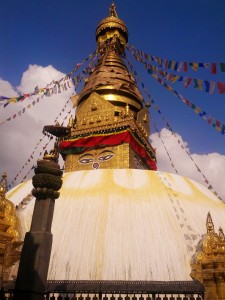In May 2014, the Guardian published an article GTA V to Skyrim: the 10 most beautiful walks in gaming. The writer claimed that modern games are “exotic and atmospheric, and expansive enough to explore at leisure” and the photographs accompanying the article were certainly evocative; particularly when I remember the excitement greeting the landscape of Midwinter when it came out in 1989.
The idea of walking in computer games turns up in other places – the game Myst was built around little more than exploration. And, in October 2014, a man completed a sponsored walk in GTA V, crossing the map in 6 hours to raise money to buy his mother a diabetic medical alert dog. My first response to this sort of news is revulsion. How can people spend so much time on something that is not real? I’ve mostly avoided computer games since I was a teenager, not wanted to get sucked in and miss out on ‘real life’. But maybe I’m in some way prejudiced.
I went to a party at the Lady Castle just before Christmas. As I was leaving, a man cornered me and said he had something to tell me that would interest me. I didn’t remember meeting him before, but didn’t say so, and he told me how he’d got an Oculus Rift. I’d seen one of these demoed at the Catalyst Club and was impressed, although not enough to buy a development kit. The man at the party told me the device would change everything. For him, the biggest market would be people who lived in bedsits, confined in miserable rooms, people who wanted something more.
There was a 60-second Playstation advert on this theme from 1999, Double Life. A series of regular people take turns in narrating to the camera. “You may not think it, to look at me,but I have commanded armies and conquered worlds… I have no regrets. For though I’ve led a double life, at least I can say: I’ve lived.”
Is it right to privilege real life over imaginary worlds – particularly when the work of Guy Debord and even Iain Sinclair both question how authentic the systems of the modern world are? Eve Online has an exchange rate with our world; gold farming has produced mundane jobs within multi-player environments; people take tourist photos of Elder Scrolls. If we are questioning what’s real about the real world, should we also be questioning what’s unreal about the unreal world?
